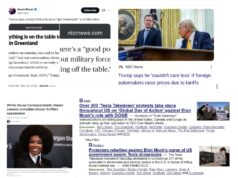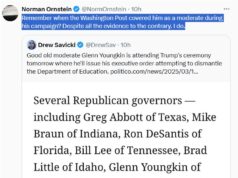by Alicia Plerhoples
Three days after the Democratic primary for Chairman of the Fairfax County Board of Supervisors, the Washington Post Editorial Board accused me of running on identity politics, called me and other primary candidates “insurgents”, and praised the “establishment.” Let’s review for those who need catching up — I ran for an open seat against three white men varying in age from early 50s to early 30s. I am a black 40-year old American woman. We’re all Democrats. For much of the race, I found myself battling the Post’s biases instead of my primary opponents’ who largely treated me, my identity, and my ideas as equal. Indeed, the Post could learn a thing or two from my opponents.
The Post’s Editorial Board may find this shocking but there is not a day that I don’t wake up as a black woman. These two identifiers — “black” and “woman” — are as much a part of me as me. What the Editorial Board wanted me to do was shed my blackness, shed my womanhood, and to pretend that those identities do not affect every single moment of my life. That is what the Editorial Board meant when they accused me of “identity politics”. They meant for me to strip away what I cannot. They meant for me to be quiet about the experiences that only (or mostly) women face, like being catcalled on the street or interrupted during meetings, or asked how you plan to be in office when you have two small children (the question the Editorial Board asked me during my endorsement interview). They meant for me to be quiet about experiences that only (or mostly) black and brown people face, like being racially profiled while shopping or driving, or shown houses only in certain parts of town. But these experiences are exactly why we need women and women of color in office; and not just in office but also talking about their racialized and gendered experiences while running for office.
These experiences translate into good public policy — good because it reflects the reality of our constituents’ diverse lives, including the lives of most of the residents of Fairfax County who are either people of color or women.
As a local elected official, I would fight for longer paid parental leave for our county employees because I know that three weeks after having a baby the last thing many women want is to return to work — one’s breasts are likely swollen with milk and post-partum bleeding and discomfort typically has not stopped — not to mention, the baby.
As a local elected official, I would not call for more Student Resource Officers in our public schools as a means of reducing gun violence because I know that black and brown students are disproportionately targeted in our school-to-prison pipeline. I know because I experienced racial profiling as a child and continue to experience racial profiling as an adult.
But the Editorial Board would have preferred that I, and presumably other women and women of color, stop talking about our identities when we run for office. Just as the rest of the United States is taking diverse perspectives seriously — discussing #MeToo, discussing reparations for slavery, discussing white privilege, discussing the threat of white nationalism — the Washington Post Editorial Board would like us to take several steps backwards. We will not. I will not.
The Editorial Board unnecessarily injected its anti-woman and anti-family bias into a race for the political head of the largest county in Virginia. It did so when it asked me and other women candidates about our families during our endorsement interviews. It did so when it lied and said post hoc that my opponent had also been asked the same question, despite them having told me in real time that he had not.
Post-primary, the Editorial Board unnecessarily injected its white privilege into the race by claiming a status quo triumph over “identity politics,” when that term is denounced and shunned by even the most mainstream of political commentators or journalists.
Shame on them. Our racialized and gendered experiences matter, particularly when women of color run for elected office and yearn to shape public policies that govern our diverse voices and bodies. We will not be shamed into silence about our identities and experiences by an out-of-touch media.



 Sign up for the Blue Virginia weekly newsletter
Sign up for the Blue Virginia weekly newsletter








